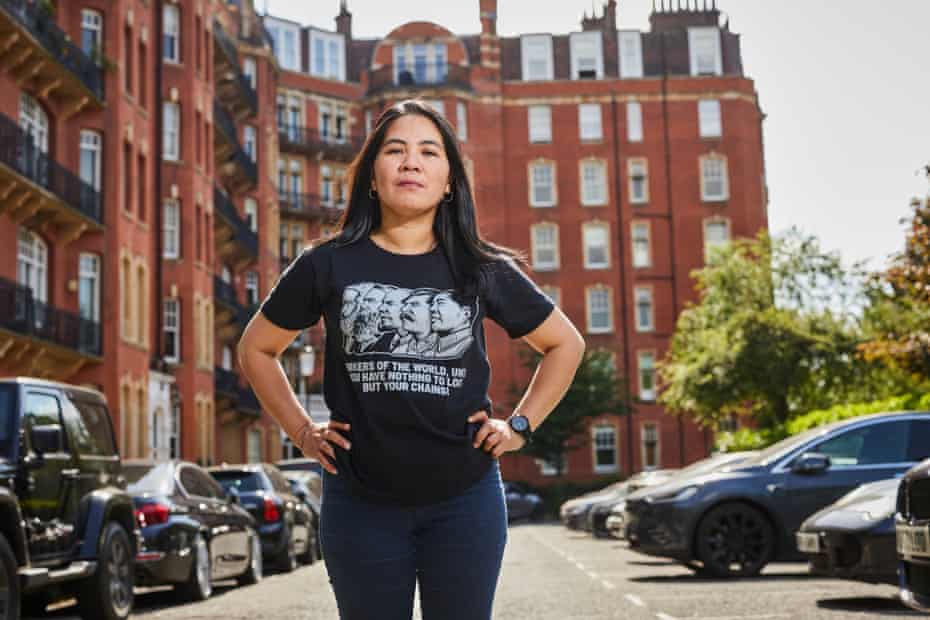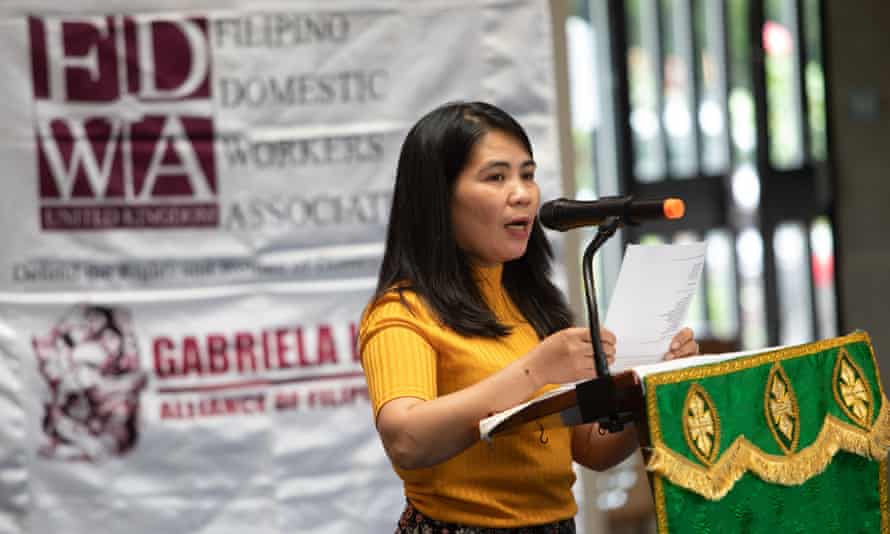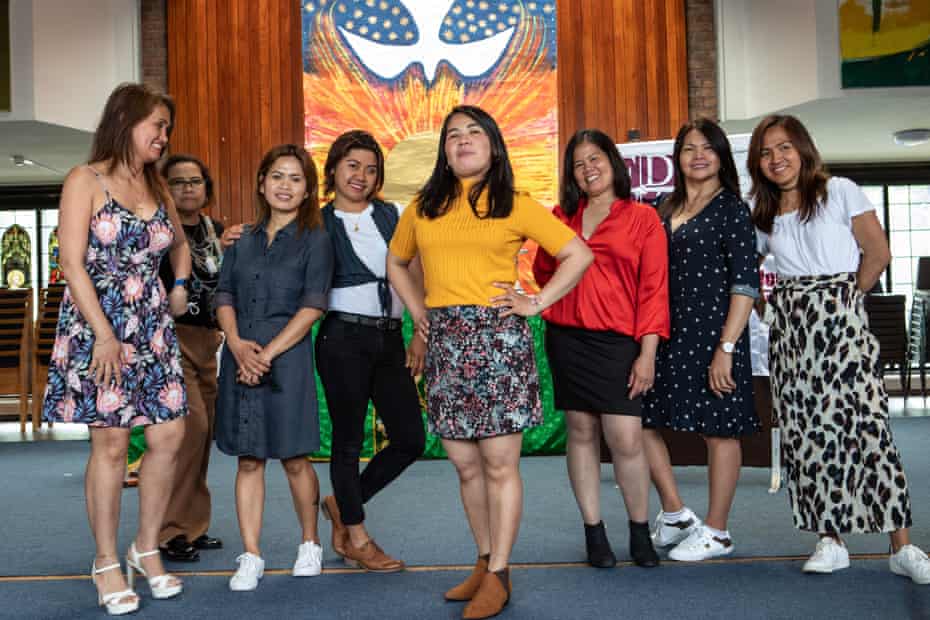‘I want them to feel human again’: the woman who escaped slavery in the UK – and fights to free others
by Annie Kelly

Analiza Guevarra ended up in a living hell in London after fleeing poverty in the Philippines. Now, her organisation rescues scores of people in domestic servitude every year.
The streets of west London were dark and empty as Analiza Guevarra walked towards a large, white mansion block in South Kensington in February 2019.
Just after 5am, she stood at a corner, well away from any street lights. “I’m here,” she tapped into her phone. Seconds later, her phone pinged back. “I’m coming, I’m carrying a green bag. Please wait for me.”
Guevarra squinted down the gloomy street until she saw a woman emerge from one of the buildings clutching a holdall. She beckoned to her. The woman, panting with fear, slid up the icy street towards her. When she got close, Guevarra grabbed her hand and told her to run.
When they arrived at the nearest underground station, Guevarra turned towards her companion. “She kept looking around to see if she was being followed,” she says. “But I was telling her: ‘You’re safe now.’”
There is nothing in the Philippines. All the women in my neighbourhood eventually have to leave
The woman was Gloria, a Filipino domestic worker who had been brought to London by a wealthy Qatari family and exploited and abused. Gloria had posted frantic calls for help on a Facebook message board and the Filipino Domestic Workers Association (FDWA) had responded. This small but very busy organisation, which operates from a church in south London, has rescued hundreds of women from domestic servitude behind the closed doors of London’s most exclusive neighbourhoods.
Domestic servitude is one of the most prevalent forms of modern slavery in the UK and largely affects foreign domestic workers from places such as the Philippines and Indonesia. “The places we go in London, the streets are full of expensive cars and the houses cost millions of pounds, but inside there are women being treated like slaves and nobody knows,” says Guevarra.
Guevarra is one of the FDWA’s most active members. She spends her days scouring social media sites for messages from women trying to escape abusive employers. Gloria was her first solo rescue. When I ask her if she was scared, she smiles and shakes her head.
“I thought: ‘Maybe I should be scared, as I know these rescues can go wrong,’” she says. Yet Guevarra did not hesitate. “I’ve been in her position. I was the only person coming to help her.”
I meet Guevarra at the FDWA’s church, where many Filipino domestic workers come to worship and share stories about their lives. She is tiny and softly spoken, her face opening into a beautiful smile when she shows me photos of her four children in the Philippines. Yet she carries a heavy sadness, the legacy of all she has endured.
She and her brother and sister grew up in a small town in the south of the Philippines. “Everyone around us was poor, but we were poorer,” she says. Her mother wanted her to finish school, but she left when Guevarra was five. One of Guevarra’s most vivid memories is of clinging to her mother’s dress as she walked out the door. “I still remember how it felt, understanding that we were being abandoned.”
The following years were hard for Guevarra and her siblings. “I remember this time as just surviving, every day waking up and thinking: ‘Today I will try to live through this.’”
When she met her husband, it felt as if she had found a place of safety. “He wasn’t perfect, but I had someone I trusted and he made me feel like I wasn’t lonely for the first time in my life,” she says.
They were just 18, but their families put pressure on them to marry. It happened so suddenly that Guevarra did not have time to work out how they would survive financially. “By the time I was 25, I had four young children and we were struggling. We were both working many different jobs, but there was never enough money.”
The spectre of her childhood poverty haunted her. “I remember washing out the plastic bag that my mother had carried fish in from the market, because it was the only thing I could find to take my books to school,” she says. “I felt very ashamed and scared that this was going to happen to my children.”
As with many women in the Philippines, the decision to move abroad for domestic work began to seem less like a choice and more like a necessity. “There is nothing in the Philippines. All the women in my neighbourhood eventually have to leave,” she says.
There are now at least 53 million domestic workers in the world, the vast majority of whom are women such as Guevarra, who travel from poor countries to richer ones to work in private households. In the Philippines, nearly 17% of people live in poverty. Official remittances sent by overseas workers in 2020 were valued at $33.2bn – nearly 10% of the country’s GDP. According to the UN’s International Labour Organization, domestic workers are one of the workforces most vulnerable to abuse, trafficking and exploitation.
“We’d all heard the stories about the terrible things that happen and I knew that it was like the roll of a die,” Guevarra says. “But I had to go for my children. I planned to go for three years, make enough money to get them through school and pay off our debts and come home.” She signed up with an agency and got a job in Qatar.
Leaving her children, who were 12, 10, eight and six, was a terrible trauma after her abandonment. In the end, she waited until they were at school. “I kept remembering the feeling of clutching at my mother as a little girl,” she says, in tears. “So I didn’t even say goodbye.”
She arrived in Doha in November 2015 after a long, exhausting flight. “When I came into the house, I thought they would show me to my room or give me something to eat, but my new employer said: ‘Put your bag down and start work!’ It was the middle of the night, but I had to leave my bags in the hallway and start cleaning the floors.”

Guevarra was one of four domestic workers employed by the family in a large house with eight small children, including one-year-old twin boys and a three-year-old. At the time, the kafala system, which made it illegal for migrant workers to change job or to leave the country without their employer’s permission, was still in place (it has since been reformed). The domestic workers were expected to work 14 hours a day, seven days a week. Guevarra’s employer would scream at them for not working hard enough and encouraged her children to abuse them, spit at them and pull their hair. “We were treated like we were not human,” she says.
In July 2017, the family told Guevarra that they were travelling to the UK for medical treatment for one of their children – and that she was going with them. “I didn’t want to go to the UK, but I wasn’t given a choice,” she says.
The family applied for an overseas domestic worker visa on her behalf. This allows foreign families travelling to the UK to bring their domestic staff – maids, chauffeurs, nannies – with them for up to six months. Domestic workers who apply for this visa – which costs £516 – are supposed to have a confidential interview at a British consulate before it is granted and another when they arrive in the UK with an immigration official. Guevarra says that neither happened.

“We went to the British embassy in Doha, but my employer was there and they just gave him the visa,” she says. “When I arrived in the UK, my employer just passed my passport over. I was not told that I had a right to the national minimum wage, that I had any employment rights or that if I was abused then I could get help.”
Guevarra says her life in London became a living hell. Without her colleagues, she had to work from 5am until 1am every day, sleeping just three or four hours. She was made to sleep on the floor of the nursery and was woken up constantly by the children. She was soon delirious with fatigue.
The family did not even give her food, so she had to scavenge and steal what she could without them noticing. They also refused to pay her full wages. In total, she was paid £680 for two months of working 18- to 20-hour days, seven days a week.
But the worst thing, she says, was the isolation. She was not allowed to leave the house without a member of the family and was told not to talk to anyone, especially other Filipinas.

Guevarra also bore the brunt of her employer’s stress and anger. “There was no way I could look after eight children and do everything else she asked of me,” she says. Then her employer went from verbally to physically abusive. She started to slap Guevarra on the face and head and push her over. One day, she beat her to the ground, kicking her repeatedly in the stomach as she lay on the kitchen floor.
“That’s when I knew I had to go,” she says. Guevarra had been beaten enough as a child to know that things would only get worse. “I believed they would end up killing me.”
Yet she was too scared to go to the police. “In Qatar, if you leave your employer without their permission, you can end up in jail. I had no idea it was any different in the UK,” she says. The family had recently moved apartments, but a Libyan couple who lived in their old building had become aware of her plight and offered to help her.
One day, very early in the morning in September 2017, she slipped out of the apartment with a bag and made her way there. The couple gave her a job. However, it soon became clear that, while they were not abusive, they still expected her to work relentlessly for less money than she had been promised and controlled her freedom of movement.
They did, though, allow her to go to church – which is how Guevarra found the FDWA. “I had Googled where the Filipino community worshipped and found out about the church. The moment I walked in, they told me: ‘Now you are in good hands. You are no longer a slave.” And I just cried. On that day, I felt free for the first time in a year and a half.”

Advertisement
That Sunday, another three women had come to the church seeking help. “One woman, her family was from Dubai, she suffered very bad violence. I realised that it was happening all over London.”
The FDWA gave Guevarra a place to stay and accompanied her to the police. Since then, she has been confirmed as a survivor of modern slavery by the government, but has also been trapped in immigration limbo. She wants to get discretionary leave to remain, so that she can work to pay off the £4,000 debt that she says her family owes their creditors in the Philippines. “If I go back now, I’ll have no option but to leave again to the Gulf and I’m scared the same will happen again,” she says.
She may not be able to control her own fate, but that has only made her more determined to fight for other women found by the FDWA. “They saved my life and now I want to save others,” she says.
Despite the nature of their work, the community at the FDWA is joyful. At their weekly meetings, there is line dancing and laughter; food is shared out. “Everyone is listened to and respected; we are a family to each other,” says Guevarra.
She says that she and a small band of FDWA volunteers rescue more than 100 domestic workers in London every year. “You see some terrible things. One woman hadn’t been out of the house for a year. Another one got Covid and they just put her in a room and left her there,” she says. The FDWA says that the abuse of domestic workers has got worse during the pandemic: sick people dumped outside apartment buildings or at hospitals; extreme violence; wage theft.
It has been harder to reach domestic workers during the pandemic, but in the coming weeks Guevarra and her colleagues will resume their outreach programmes. They will head to places where they know domestic workers will be looking after their employer’s children.
“Once you have been through it yourself, it’s quite easy to see which women need help,” says Guevarra. They slip them notes with the FDWA’s number on them, or sit next to them on park benches, whispering that they are not alone.
Guevarra also does one of the hardest jobs at the FDWA – caring for domestic workers who get sick. “I have sat with two women who were dying from cancer, so far from their families,” she says. “They left with such hope and now they’re going home to their children as ashes. I held their hand as they died, so they wouldn’t be alone.”
Guevarra hasn’t seen her own children for six years. When she arrives home, she will have missed their childhoods. I ask how she keeps going. “This work is my life; it keeps me hopeful,” she says. “Our employers felt like they could treat us like animals. When I found the FDWA, I felt human again. I want to make others feel that, too. It makes it all worth something.”
